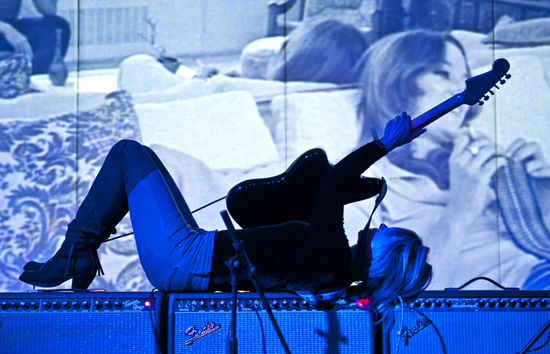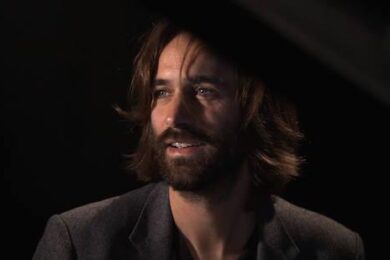All pictures courtesy of Katja Ogrin bar the exterior shot of Ozzy’s house taken by Cay McDermott
A Salutary Lesson In The Indignities Of Fandom
The whole phenomenon of artefacts that accrue quasi-magical value based on momentary or prolonged contact with cultural icons is a tawdry one. Cast-off clothes and ragged, signed paperbacks are secular relics, the modern equivalent of the knucklebones of St Barnabas. I’ve left the urge to gather such things in my teenage years, where it belongs.
Mostly.
This year’s Supersonic bill featured two performances from one of my absolute favourite musicians of all time, Tatsuya Yoshida – first, drumming with Zeni Geva and then solo as RUINS Alone. At one point during the unfeasibly ridiculous and impossibly complex mayhem of the latter set, a stray stick came arcing through the air and found itself in my possession. Had the story ended there, I might have gone home with a nice souvenir. But no. A friend suggested I get it signed. With my judgement impaired by a hyper-prog-induced endorphin rush, this seemed like a good idea.
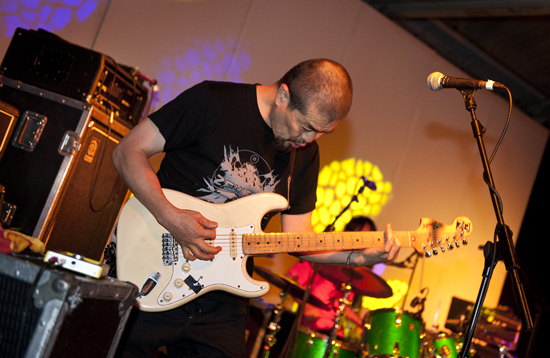
I encountered Tatsuya in the merch area. After a brief exchange of pleasantries, I said, "oh, and I have your drumstick…" and presented said item, reaching for my pen with the other hand.
"Thank you," he said. "I was looking for that."
Thwarted, embarrassed, not wanting to deprive a touring musician of his gear, I handed it over and scurried away.
This sorry tale has two morals: one, there’s no dignity in asking for an autograph, even less in failing to get one. Two, never meet your heroes – they’ll only take back the stuff you stole from them.
Matt Evans
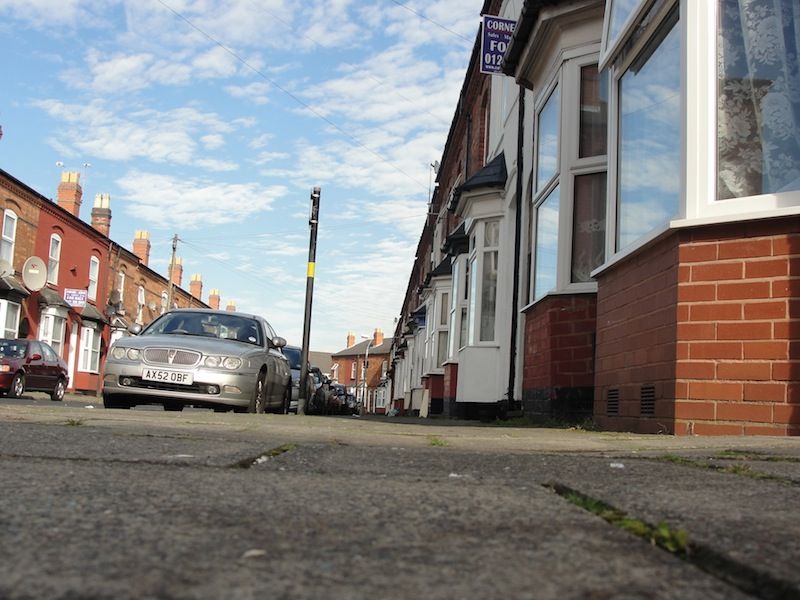
Ozzy Osbourne’s family home in Lodge Road, Aston
Death To False Transport! True Metal Is For Walkers!
"Follow me now and you will not regret/ Leaving the life you led before we met"
Black Sabbath, ‘NIB’
It is a crisp autumn day and I am standing outside a nondescript mid-terrace house in the suburb of Aston in the north of Birmingham. White UPVC door, net curtains in the living room window – its near-duplicate could be found in any city in England. However, this house is special for one particular reason – it was the childhood home of Ozzy Osbourne, frontman of Black Sabbath and probably Birmingham’s most famous musical export (sorry Jamelia). There’s no blue plaque, although there is a Sky dish.
I am participating in a short (90-minute), highly specialist walking tour being held as part of the festival. Crossroads Of Sabbath allows a strictly limited group of participants (two taxis’ worth) to follow in the formative footsteps of Ozzy, Tony and Geezer. According to our guide, Ozzy’s old bedroom is available for rent via AirBnB for the princely sum of £288 per night although, as the house is occupied, you’ll have to sleep in a bunk bed and eat your Weetabix with the current owner’s children the next morning.
You could be forgiven for thinking that the idea of a tour in which you’re marched around famous people’s childhood stamping grounds is a little old hat. After all, any city that can cobble together something describable as musical heritage is doing it nowadays. Manchester has its Oasis and Hacienda tours and in Liverpool you can pay to be driven around in a rickety coach with "Magical Mystery Tour" painted on its side (the experience is neither magical nor a mystery). Crossroads Of Sabbath is something different – one man’s hand-knitted mix of sociology, anecdotal history and musical geekery – a personal project rather than a tourist cash-in. Certainly, I’ve yet to see another walking tour which comes with its own fanzine. I would describe it as psychogeographic, but the tour’s creator, Rob Horrocks, plays that side down, keen to present himself as a kind of muso historian piecing together rock family trees rather than a cultural studies-type sniffing out the elements in Sabbath’s background that shaped their lyrics and riffs. Rob has cross-referenced biographies with calendars and maps in attempt to pin down the locations of various crucial moments in Sabbath’s early history – first meetings, abortive musical projects and the like.
Aston itself is a fairly typical working class area, full of scuffed-looking takeaways, cramped internet cafes and greengrocers heaped high with exotic-looking fruits and herbs. The only thing distinguishing it from somewhere like Govanhill in Glasgow or Levenshulme in Manchester is the towering spectre of the Aston Villa ground in the distance. While a person could easily
wander around, crossing places off a list (places like 67 Park Lane, where Tony Iommi grew up in the company of a foul mouthed mynah bird, or 210 Witton Road, which he ‘visited’ twice in 1966 in the guise of ‘John the Burglar’), without Rob’s explanations you’d just be looking at a bunch of buildings, free of context and meaning. "People keep asking me if I’d be interested in doing a podcast so they can do the tour for themselves," says Rob. "But I think that would take something away from the whole experience." The whole point of Crossroads Of Sabbath is that you’re walking in the footsteps of the men themselves, seeing it all first-hand – and taking in a bit of modern British social history while you’re at it.
And, because you’re in Birmingham, the "land of 1,500 trades", that history is tied up in its industrial heritage. One of the most compelling parts of the tour occurs when we all stand on Witton Road
and are asked to imagine the scene as it would have been in 1953, when Ozzy was a short-trousered schoolboy, and the area would have been at the drab, grey zenith of its postwar incarnation. As Rob tells us:
"…the trams had stopped running and the tracks were taken up. Several local residents of the time report that all the way up the road the local children could be seen loading wooden blocks from under the tracks into wheel barrows and discarded prams to take home. With wages from the factories at subsistence level any chance to obtain free fuel was taken."
Factory life and social life were invariably linked, with workers living within the sound of the hooter, attending social events organised by paternalistic capitalist bosses, their every need catered
for within the factory gates. They were "machines operating machines", the fruits of their labours seeping into the Midlands landscape and influencing everything they touched. The echoes of this Victorian world are still visible in the often derelict locations Rob singles out. We learn about factories that Ozzy, Tony, Geezer’s parents worked in while standing in the car parks that now occupy their sites.
And then there’s the crossroads where the tour ends, which Rob posits as Birmingham’s equivalent of the junction of Route 61 and Route 49 at Clarksville, Mississippi where Robert Johnson is supposed to have sold his soul to the Devil. It’s unlikely anyone sold their soul here, at least not in exchange for musical props. On one corner, there’s the Newtown Community Centre (where the band’s earliest practices took place) and, across the road, a pub called "The Shareholders Arms" (possibly the only pub with that name in the country – a perfect monument to the free market capitalism that both allowed Black Sabbath to become famous and contributed to the later degradation of the area). Rob produces a commemorative one-of-a-kind Crossroads Of Sabbath tea towel, which participants brandish proudly as they get their pictures taken on the crossroads.
Looking up the hill, back towards Aston, Rob invites us to imagine two young men walking back home after a night out in the city centre. One, Tony Iommi, is a "well-turned Blues freak", the other, Ozzy Osbourne, "a soul boy with cropped hair and improvised attire". Their paths converge at the crossroads and a musical legend is born.
The tour is designed as a social experience, so it’s natural that we finish up in the pub (not The Shareholders Arms) for a well-earned pint. We’ve just experienced one person’s labour of love and years of research in an hour and a half (and got some fresh air at the same time), so it’s now time to rest our legs, debrief and digest what we’ve just learned. We chat about Ozzy, about Birmingham and myriad other things before we disperse from Sabbath’s crossroads.
More information on the Crossroads of Sabbath here. Tours will be running throughout 2013.
Christina McDermott
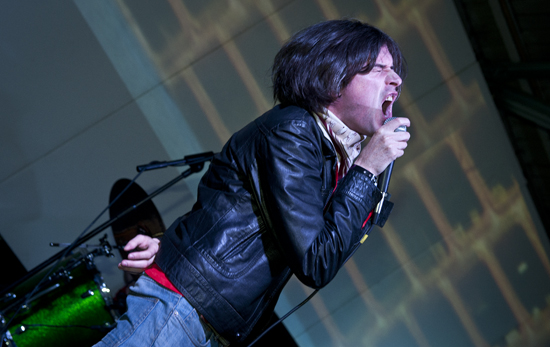
Drum Circles Aren’t Just For Hippies, They’re For Real People Too
All festivals are, in a certain sense, the brief coming together of a particular diasporic musical community – certainly ones the size of Supersonic, Tusk or even the various ATPs – and you know that while individual tastes may differ, everyone is there for the same reason; everyone is there to share in the same passion. The first year I attended Supersonic in 2010, by myself, I knew nothing of the majority of the acts on the bill; outside of The Quietus’ own John and Luke I arrived, essentially, knowing nobody. The friendships I made that first year coupled with the ineffable, intangible atmosphere of togetherness that radiates out of the very brickwork of the old factory units and viaducts that make up the festival site and the joyous, collective appreciation of the extreme, the experimental and the obscure are what keeps me coming back.
On Sunday night, just as the beautifully uncomfortable strains of the Oxbow Orchestra were drawing to a close, in a small marquee outside of the Warehouse stage, led by some of the admittedly uncomfortably hippyish looking members of Gnod – including one who appeared to have survived the drug-induced brain aneurysm he suffered during their deranged yet brilliant set – a dozen or so punters, plus members of Teeth Of The Sea and Goat, spontaneously started using any surface and any implement (including beer cup on table and wooden canes on security rails) to create what you’d probably have to call a drum circle.
Loud, twitching, pulsating, cacophonous – it’s hard to say exactly how long it lasted, but it sure drew a crowd; it forced home that sense that, unlike at many festivals, at Supersonic the performer/punter dynamic is of a whole other nature. I’m not going to give you some bollocks about how the punters are the festival – it’d be nothing without the bands and the people behind the scenes working themselves to early graves to give us lucky few such an experience, but there is a sense of community here in the neutral zone of the second city that is largely lacking in the real world. "You lot really don’t know how lucky you are."
Toby Cook
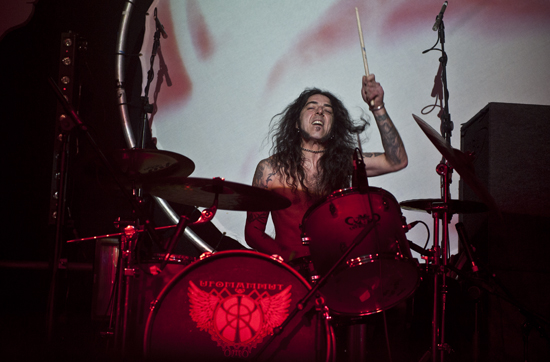
Mutate To Survive
To me this year’s Supersonic was to not just a celebration of the festival’s tenth anniversary. Having attended five of the ten festivals, it has been a chance to understand just how much Supersonic has altered during that span of time. This year, the line up seemed to suggest that the festival was referring to itself more than anything else. Of the 42 groups and musicians listed in the 2012 programme, 15 had made at least one previous appearance at Supersonic. Identifying the returnees such as Dylan Carlson, Chris Corsano, PCM, and DJ Scotch Egg also brought about an awareness of just how much the Custard Factory complex itself has changed the nature of the festival as a spectacle.
As this year’s event progressed, it also became an almost involuntary reaction to remember where else I had first seen them. Whilst being blasted by The Bug’s ground-shaking Warehouse set on the Saturday night, I recalled catching the beginning of his set at the intimate and much-missed Medicine Bar stage on the opening night of the 2006 festival. Similarly, Jarboe’s magnificent performance in the confines of the Old Library revived memories of her fiery duel with Esoteric on the Space 2 stage from 2009. The former was one of contorted elegance and restrained accompaniment, the latter a phosphorescent vision of power and violent energy. Some returnees seemed pleased to transfer their innate menace to new surroundings, like Drunk In Hell, whose enraged malevolence threatened to override their Old Library confines in 2011 but seemed to reside more comfortably on the Boxxed stage this year.
One musician who has proved himself the epitome of flexibility at Supersonic is Chris Corsano. His effortless improvisations as part of Flower/Corsano Duo in 2009 and 2012 are as vivid and all-embracing as his contribution (alongside Heather Leigh Murray) to the 2010 festival was divisive: Jailbreak’s howling set on the Outside stage that year still ranks as one of the most notorious in Supersonic history. The Outside stage area, once the heartbeat of the entire festival, has now become a tranquil, almost noiseless refuge from the new layout of performance spaces.
The ever-changing nature of the festival means that whenever a venerated group or musician appears, they have as much to prove as anyone making their debut. Nowhere was this more apparent than in the form of the Zeni Geva. With the memory of their exultant set of 2010 still resounding in many observers’ minds, the severity of the punishment meted out by KK Null and Tatsuya Yoshida more than overcame the absence of Mitsuru Tabata, forging a fresh gig-going experience into the annals of the festival. To imply that Supersonic 2012 was the best ever would imply that the festival has nowhere left to go or nothing else to improve upon. To have reached its second decade is precisely the challenge that Capsule is more than capable of meeting.
Kevin McCaighy
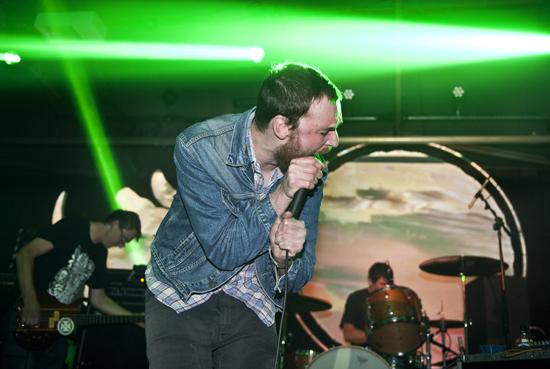
Time To Put Down The Bong And Take It Seriously?
It’s all well and good when we bang on about Hey Colossus being the nearest thing the UK has to inheritors of the crown of the Butthole Surfers, yet if their festival opening set on Friday in the Warehouse stage proved anything, it’s that if they’d stop fucking around they could easily be the most vital noise rock outfit in the county; seriously, they could be headlining a festival like this. No doubt they’d tell me to fuck off were I to put it to them that if they’d just put down the bong, tour a bit more and take a more contrived attitude towards PR, they could achieve a greater deal of relative success, and in fairness they probably should – why should I stifle their creativity by insisting they do something as mundane as to take it a bit more seriously?
If Supersonic proves only one thing it’s that in 2012 it’s still possible to put on a festival with absolutely no compromise whatsoever, and to a degree the likes of Hey Colossus and Drunk In Hell and tangible examples of that same attitude – the divine comedy, that knowing sense that it’s all fucked and the biggest joke in life is life itself, so why not get up there and make as much fucking noise as possible; if people don’t dig it, fuck ‘em. Except in the case of the south London outfit, people do dig it – Friday night’s crowd was, by the band’s own admission, possibly the largest they’ve ever played to, and it was probably as good as I’ve ever seen them play too. Brooding, thunderous, anarchic, cacophonous and occasionally, wilfully repellent. And yet at the same time utterly compelling and, I suppose, punk as fuck.
Toby Cook
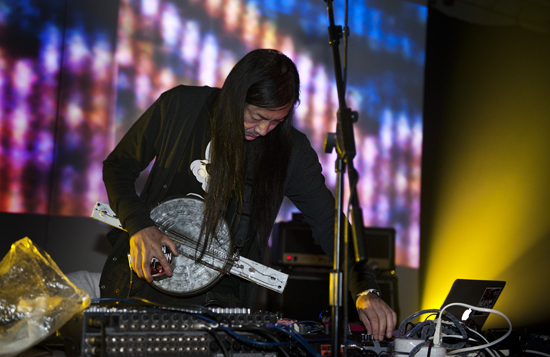
The Fine Art Of Cake (And A Recipe For Cardamon-Cinnamon Crumb Loaf)
I’m pretty much convinced that, as well as hosting the most interesting bands of any music festival currently taking place in the UK, Supersonic also serves up the best cake. In fact, it’s the only music event I’ve been to that takes the fine art of baking so seriously. I’m not sure if any other weekender even has its own tea room, let alone gives it equal billing with the band stages in the programme. Organisers Capsule make no secret of their love of cake either – at this year’s event, they thanked their donors for their contributions by holding a tea party for them (you laugh, but chimps in bowler hats are fanatical about their doom metal). For someone like me, who loves baking and bogling in equal measure, it’s an absolute joy.
The tea room (also a record shop and exhibition space of sorts) is the best place to spend a hungover Sunday afternoon. Hunched over a slice of lemon drizzle and a double-bagger brew, I observe my fellow festival goers enjoying a much-needed peaceful moment, lost in silent contemplation in the company of high-qual home baking. Tea and cake turns out to be a great social leveller. The young family thoughtfully picking at slices of vegan chocolate and cherry loaf are parked next to the tattooed rocker in a Sunn 0))) t-shirt merrily tucking into a doorstep-sized wedge of carrot cake. The room was like a scene from the Great British Bake Off with the bunting and purse-lipped WI matrons replaced by misguided piercings and patiently farmed facial hair.
This is now the fifth Supersonic I’ve attended where I’ve returned home with dented hearing, a head full of static and a new cake recipe. This cardamom cinnamon crumb loaf was one of the best things I ate at the festival, consumed after I soaked up Tim Hecker’s set. I was so overcome by his beautiful, joyous noise that I wanted to up the high further through the judicious application of baked goods. Full of sugar and spice, this cake is much like Supersonic itself – a slice of sweetness spiked with something complicated, unexpected and wholly delicious.
Cardamom cinnamon crumb loaf (Makes one medium-sized loaf)
For the loaf cake
• 300g plain flour
• 1 tsp baking powder
• 2 tsp vanilla essence
• 200g unsalted butter
• 150g soft brown sugar
• 2 medium eggs
• 200ml single cream
For the cardamom-cinnamon crumb
• 75g butter
• 75g soft brown sugar
• 75g plain flour
• 2 tsp cinnamon
• The seeds from 6 cardamom pods, ground with a pestle and mortar
Make it!
- First, grease a medium sized loaf tin well, and heat your oven to gas mark 4/200 degrees C.
- Sift your plain flour and baking powder together in a medium-sized bowl. Add the brown sugar and combine well with a wooden spoon.
- Melt the butter in a small saucepan. Leave to cool for around five minutes, then add the eggs, vanilla essence and cream.
- Combine the wet ingredients with the flour and sugar mixture until a firm, sticky batter has been formed. If you find the batter to be a bit dry, add a touch more cream. Pour the batter into your loaf tin.
- Now, make your crumb topping. Place the butter, flour, sugar, cinnamon and cardamom in a bowl and combine well with your fingers until rough sticky ‘crumbs’ have been formed. Layer these on top of the loaf cake batter.
- Bake the loaf cake at gas mark 4/200 degrees C for around 45 minutes-1 hour. The cake is done when the crumb has become browned and firm, and when a toothpick inserted into the cake comes out clear.
- Serve with coffee and a side order of noise.
Christina McDermott
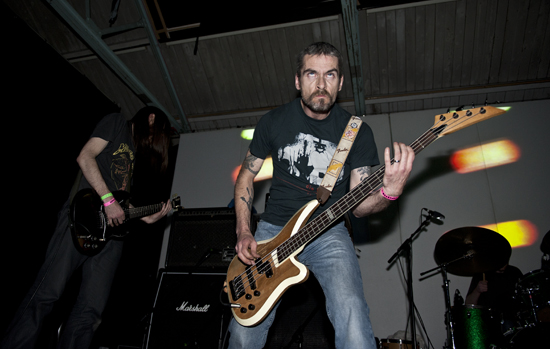
Nothing’s Shocking
No-one wants to admit to being shocked by anything anymore. People are as keen as ever to be offended by bigotry or graphically violent imagery, in all art forms, but there will always be a knowing and jaded commentator on hand to point out that they’re just doing it for effect or publicity or attention. A precedent for the outrage in question will invariably be cited, too. Why do you think GG Allin repeatedly claimed he was going to off himself live on stage (before actually dying of a heroin overdose in someone’s house)? Well, because he was an idiot, but one astute enough to know it would be an untoppable – pun mostly unintended – act of audience confrontation. In lieu of anyone doing it since, and the deep trauma it would probably induce, musicians continue to try and fuck with the heads of people who are far too cool and aloof to let their heads be fucked with.
Some of these musicians are performing at Supersonic, which to an extent operates as a platform for this precise carry-on. Some of them were releasing records while GG Allin was still alive. Yet even though there were bands twenty years or more ago who were both legitimately challenging and legitimately successful, it seems unfeasible that a festival like this could have thrived in Britain back then. Supersonic’s success has much to do with… not the mainstreaming of noise, exactly, but at least the removal of its ghettoisation. Indie kids and techno spods bugging out to Sunn 0))), kinda thing. Horrible music lends a hand to Supersonic, and Supersonic lends one right back, especially if you’re Drunk In Hell, who were the best band I saw at the festival last year, and are the best band this year.
Drunk In Hell come from Middlesbrough, have never toured or released a record, and make music that feels like it’s draining the fat from your body. Their presumed influences – Kilslug, Brainbombs, Drunks With Guns, Whitehouse – are nevertheless red herrings: there’s no schlock here, no wilful ineptitude, nothing as self-regarding as a concept, just unceasing, uni-riffed storms of feedback, assault and pig-fuckery and Michael Bishop vocalising like he’s exorcising. For a band who genuinely seem to have almost no interest in your patronage, DIH are treated as kings. A moshpit – perhaps the most cheerful and benign moshpit ever – starts during, I think, ‘Chick Flick’; ludicrously, a security guard climbs over the barrier to try and maintain order. Either she has no prior experience of live rock music, or feels that frivolity does a disservice to a band whose ability to flay you alive is perhaps unmatched in 2012.
They’ve only been doing this nonsense for four years, though. Oxbow have reached the age of 23. Considering that Eugene Robinson, the band’s vocalist, envisioned the band’s 1989 debut LP Fuckfest as a "suicide note", this probably deserves congratulations. At Supersonic, Oxbow are selling original vinyl copies of Fuckfest for £50; I bought mine for a pound in maybe 2000. In the UK at least, Oxbow’s momentum started about a decade ago. People left their shows saying "what the hell did we just see?" to each other, later to people who weren’t there, and so it builds. The hell they just saw was a punishing, yet musically deft and jazz-informed, noise-rock band fronted by a man who fondles himself on stage and drools when he sings (people always talk about the penis, but rarely the drool). If you know Oxbow, though, you know this: the inevitable result was that people would come to see the group expecting to glimpse a lob-on. If no-one’s surprised, it’s not quite as fun.
Which brings us to the Oxbow Orchestra, who headline the main stage on Sunday night. This is the songs of Oxbow sung by (naturally) Robinson and played by guitarist Niko Wenner and an actual, no-pissing-about orchestra, including members of ‘doom metal tuba’ band Ore. Despite the extensive reworking their music has undergone, Robinson maintains his wounded howl; conceding to decorum while admitting, "I’m having a hard time keeping my pants on." This is certainly no light classical tinkle – the players, mostly prim and besuited, slash or huff at their given instrument as keenly as Wenner and the other Oxbovians do in the ‘normal’ lineup.
Sometimes, you catch the flicker of a smile on an orchestra member when the frontman hugs the mic or sings (on ‘Bomb’) of "a land… where SODOMY is a WAY OF LIFE!" They’re probably not shocked, of course, nor is most of the audience, but it’s a safe bet that they’ve seen very few live performances quite like this before. At this point in Oxbow’s existence, that’s likely more rewarding than causing sheltered matrons and indie feebs to recoil from a bout of onstage masturbation. Maybe if GG had kept it together, he’d have rounded up an orchestra too. Maybe Drunk In Hell still will.
Noel Gardner
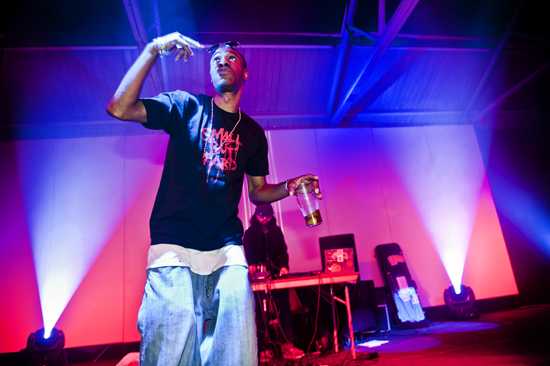
All Things In Moderation
Speaking as someone who at one point during the weekend was caught dancing like Tyres in Spaced despite the fact that, at the time, no music was playing and the people with me were trying to have a serious conversation about someone getting a taxi, I’m perhaps not the ideal candidate to be preaching moderation; if an artist wants to swallow all of their drugs mere minutes before the start of their set then who am I to argue? It certainly seemed to work well enough for Gnod. No so much for one-time Jungle Brother cohort, and perhaps the most ironically monikered man in rap, Sensational though.
Undeniably Friday night’s Small But Hard showcase in the Boxxed venue was a particular highlight in a festival full of them – in fact, if openers Devilman aren’t your new favourite band then there’s probably something wrong with you – but it was so very, very nearly ruined by a man who on this occasion was to rap what Oliver Reed was to chat shows; it’s all about moderation motherfucker!
Whilst there’s certainly humour to be had from seeing a man on stage so fucked up he couldn’t rap his way out of a paper bag, there’s tragedy too; there’s only so many times you keep stopping the excellent, chest caving beats provided by label mates DJ Scotch Bonnet and Koyxeи with the proclamation that "yo, yo, I’m having trouble with my metaphors; y’all can’t hear my metaphors" before it all becomes about as funny as that pissed guy you see at every party you’ve ever been to who’s trying to light the wrong end of a cigarette. Out of some sort of heady concoction of wishful thinking and malice I stayed until about the point he became more concerned about getting one of the rapidly thinning crowd to go to the bar for him, by which time I’d have rather been dancing to the fucking traffic lights.
Toby Cook
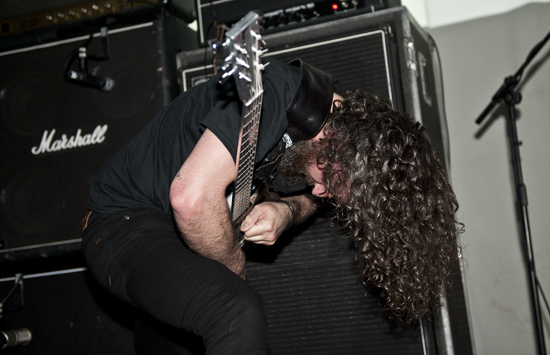
My New Favourite Band Is Called DEVILMAN
We are literally spoiled for contenders for best band of the weekend. Hey Colossus are fucking amazing and dead exciting to watch. I can’t be 100% sure without seeing a set list but I think they played ’23 Going On 666′, ‘Poppers: A Warning From History’, ‘Tough On Saville, Tough On The Causes Of Saville’, ‘Steve Reich Listens To EyeHateGod’s Dope Sick (And Begrudgingly Admits "It’s Ok I Guess"’, ‘Mr Kirk’s Night Nurse’, ‘Sutcliffe Jug Band’ and ‘Brian Eno On Fire Off The Shoulder Of Orion’. It’s good to see this unit go from strength to strength, aided in no small part by the addition of Tim from Part Chimp on drums, John from Notorious Hi-Fi Killers on guitar & clackers and what sounds suspiciously like rehearsals.
UFOmammut, the paganistic, goddess worshipping, Italian space rock trio run through all of their new, two-part, 90-minute long, one song epic ORO. Ciao bellissimo! (Or should that be bellissima?)
My Disco are so good I end up missing the start of my own after-show DJ set. They come on stage and deconstruct ‘Wrapped Coast’. Rohan Rebeiro sits behind his kit motionless as a programmed, Balearic, acid house beat plays on tape (this is essentially a live cover of Factory Floor’s remix of this track). Liam Andrews stands behind a speaker glowering at his bass without touching it. Only Benjamin Andrews is in motion, back to the crowd, hunched over with head in a speaker cone, frantically thrashing atonal noise out of his guitar like he’s running out of time. And it’s sublime, like Joey Beltram versus Loop. This band are the equivalent to this generation’s Fugazi. It pains me that barely anyone seems to have noticed.
I bug out to The Bug. Admittedly the set is very similar to the one they played at a pre-Notting Hill Carnival club set a few weeks earlier in London and that show was noticeably louder and punchier – to the extent that in the front row you could see people’s nostrils pinching with the bass. However, that was played to a partisan audience of young, up for it, bass fan Herberts and Herbettes in leisure wear who had been partying solid for six hours. As good as it was, relatively speaking it must have been like shooting fish in a barrel compared to tonight. The Warehouse space tonight contains a much older, non-partisan crowd, but that makes Kevin Martin, Daddy Freddy and Flowdan work much harder to get the energy up. The real star of the show however is Israeli vocalist Miss Red, who may well be a diminutive figure in real life but, backlit by searing arc lights, her shadow projected onto dry ice like a Brocken spectre, she fills up the entire venue with her demonic/angelic raga vocal turn. By the end, even the black metal fans are losing their shit.
Gnod fry my fucking circuits and make me want to join a cult.
Rob Lowe as Lichens is ascending like a motherfucker. Each time you see him you think "it just can’t get any better than this." And then each time it does.
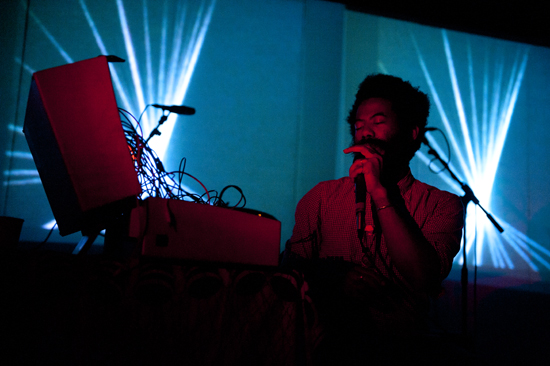
But if there is one thing that nearly always happens at Supersonic, it’s that I leave with a burning passion for a band that I’ve never heard before*. It was a bravura move putting on such an astoundingly good band as Devilman as the first act on the first day – it fills you full of righteous zeal and later makes you consider joining the Drunk In Hell mosh pit. The first act on the Small But Hard label showcase stage is at once savage but sensuous, synthetic but chaotic with a bracing sonic battery that draws from industrial dance, bass music, rave, hip hop beats, noise and heavy, heavy, heavy fucking dub.
The sheer, disdainful, caustic assault is reminiscent of Scorn’s peerless swan song at last year’s festival and it sets the bar inordinately high for the rest of the weekend. Just as you’re thinking, "fuck, I can’t believe how heavy this is", they play ‘Last Black Emperor’, Taigen from Bo Ningen and some dude who looks like a cross between Beat Takeshi Kitano and Jason Statham in mirror shades come on stage to look threatening and shit gets Neo Tokyo real.
Check out their self-titled debut on Small But Hard at your nearest opportunity.
(*After the set I phone up Luke to tell him that I’ve already seen a brilliant new band. He says: "You clown. Can’t you remember raving your head off to Devilman in 2010 last time we saw them at Supersonic when we were off our noggins?" You have to write stuff down when you get to my age, you really do.)
John Doran
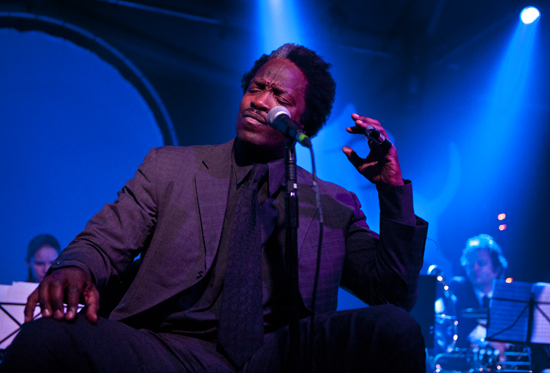
Age Before Beauty
I hate getting older. But there are two ways for the perennial awkward squad to rage against the dying of the light: you can set your visage into a permanent Meldrew-esque scowl or stoically choose to ignore the whole aging process altogether. This latter path is not to be trodden lightly. Take the late Tory MP Alan Clark: in the last volumes of his diaries he wrote of his exploits jumping between the beds of three different women (none of whom was his wife) like some priapic ping-pong ball. It’s not clever, and one assumes by the end of the whole process, it wasn’t big, either.
Music is of course, like much of late 20th/early 21st century culture, permanently set on a mission to deny altogether the existence of time’s arrow. Pop stars desperately hang on to their fading looks: 60s icons like Cher have been under the surgeon’s knife so often that they now resemble discarded Thunderbird puppets rescued from a film lot fire. And even those who (more or less) let nature take its course physically, can find themselves as mutton dressed as lamb for decade after embarrassing decade like The Rolling Stones. For some music fans, unfortunately, this is absolutely fine – the equivalent of a musical comfort blanket, or perhaps a book of old photographs. But art doesn’t – and shouldn’t – stand still.
One way to stave off the problems of old age is to just keep moving forward, without care for those that you leave in your wake: an incredibly simple idea, but one which can mean commercial suicide for those brave enough to attempt it. And it’s this approach which brings me, by a rather roundabout way, to last weekend’s rather splendid Supersonic Festival. Supersonic can be difficult to get a handle on – and thus market, one assumes – due to its disregard for easy genre programming or musically-segregated stages. Instead, performers from a great many genres are free to come together into a seething, roaring mass to infect as many listeners as they can. And while there were a great many young bucks in the line-up, some of the weekend’s best and most enduring sets were performed by people whose careers in music started as long as twenty to thirty years ago; some, even longer.
Here in abundance across the festival’s three days was evidence of fearless pioneers and experimenters, heads down and throttles set for the white hot future. Merzbow, who wowed people on Saturday night with his canonical noise music has released countless – literally – albums since 1979. 1979. That’s over thirty years ago. Similarly, Saturday had Sir Richard Bishop, once of Sun City Girls, playing both solo and as one-third of Rangda, a super group comprised of Bishop, Ben Chasny (Six Organs of Admittance) and Chris Corsano. Again, Sun City Girls released their first album in 1979. But again, it’s not all just about staying power: Bishop’s work with Rangda is some of his best yet, and Merzbow, while not always my cup of tea, just never fucking stops releasing albums that always seem to offer something new.
But the person at Supersonic that perhaps best exemplified the idea of growing old without either him or anyone else actually noticing was Kevin Martin. Listening to some of his set as The Bug early Sunday morning made me realise that, while his various outings as God, Techno Animal and Ice have little in common on the surface, he’s always had an uncanny ability to interact with fringe musical genres either just before they blow up or as they become reconfigured in some new way. And now, with The Bug, he’s not only experimenting with youthful hyper-charged dubstep, grime and industrial dancehall but he’s throwing smart bomb acid house back into the mix. His refusal to ossify and his ability to use whatever tools are to hand to embrace his own musical vision is incredibly inspiring: there’s nothing mature, per se, about The Bug’s music, but the approach belies a confidence that cares not a jot for fashion or trends. The young, then, might just learn something from this kind of caper.
Dave McGonigle

